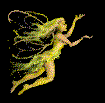Fairies
In Ireland two distinct fairy types exist---the
trooping fairies and the solitary fairies. The
trooping fairies can be found in merry bans about
the hawthorn tree or at feasts in gilded fairy
palaces. They delight in company, while the
solitary fairies avoid large gatherings,
preferring to be left by themselves and separate
from one another.
The trooping faeries are the major and presiding
residents of fairyland; but the solitary ones
(leprechauns, selkies, banshees, merrows, etc...)
have greater interest in mortal affairs and
therefore are generally more familiar to us.
Fairies exist all over the world. In Ireland they
are the 'sidhe' (pronounced shee), a name they
have retained from the ancient days.
The trooping faeries are found living in the
bushes and circles of stones that crop up all
over Ireland--the fairy raths. The fairy raths
crop up in pastures all over Ireland, and the
farmers never plow them up for fear of disturbing
the faires who live there and bringing down some
bad luck upon themselves.
The fairies are said to be very beautiful, with
long yellow hair and perfect delicate forms. They
love milk and honey and drink flower nectar as
their fairy wine. The fairies can assume any form
and can make horses out of straw. They have the
power to affect human life, especially unbaptized
children. The fairies also love music, often
luring mortals into an eternal dance with their
piping and singing.
Some information on this page was taken from "A History of Irish Fairies" by Carolyn White, Copyright 1976, Published by Mercier Press.

Return to: Lady Anna's Pages